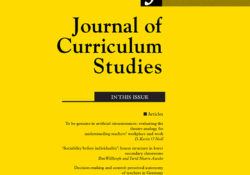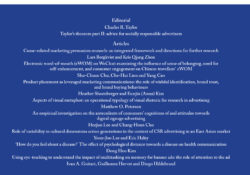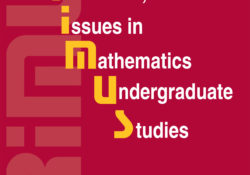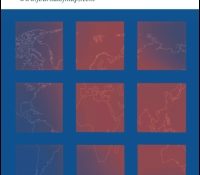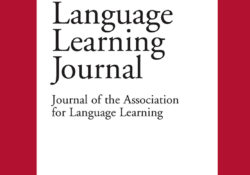eric.ed.gov har udgivet: This is the first workbook-text in a two-part series written for deaf students. It is remedial in nature, aimed at the secondary level, and covers addition, subtraction, multiplication, and division of whole numbers. The use of the number 10 in explaining the concepts presented is stressed throughout. For the second workbook, see SE 015 828, and for the teacher’s guide, see SE 015 829. (DT) Link til kilde
Like this:
Like Loading...
eric.ed.gov har udgivet: This is the second remedial workbook-text in a two-part series written for deaf students at the secondary level. It covers fractions, geometry formulas, decimals and percents, and time. For the first workbook, see SE 015 827, and for the teacher’s guide, see SE 015 829. (DT) Link til kilde
Like this:
Like Loading...
tandfonline.com har udgivet en rapport under søgningen “Teacher Education Mathematics”: ABSTRACT ABSTRACT This article aims to highlight how a scientific and critical approach is used in assessment dialogues during the last period of a practical, school-based teacher education programme. The result is based on 13 assessment dialogues conducted in a course at a Swedish university, where one of the course objectives is to, ‘in a scientific way, analyse teaching situations based on learning theories’. The assessment dialogues were analysed drawing from Bernstein’s concepts of ‘classification’, ‘framing’, ‘horizontal knowledge’ and ‘vertical knowledge’. The result shows that only in a minority of the assessment dialogues are students expected to use theory as an analytical tool and to critically examine their teaching practice. The theory is used in a more instrumental way to… Continue Reading →
Like this:
Like Loading...
tandfonline.com har udgivet en rapport under søgningen “Teacher Education Mathematics”: Link til kilde
Like this:
Like Loading...
tandfonline.com har udgivet en rapport under søgningen “Teacher Education Mathematics”: Abstract Abstract Two special issues of PRIMUS focus on The Creation and Implementation of Effective Homework Assignments. In this introduction to the first issue, we discuss the tensions facing instructors today surrounding homework design and implementation and provide an overview of recent PRIMUS articles published on the subject. Using the notion of “learning goals” as an organizing theme, we introduce the six papers appearing in Part 1, which focuses on the creation of effective homework in mathematics. Link til kilde
Like this:
Like Loading...
tandfonline.com har udgivet en rapport under søgningen “Teacher Education Mathematics”: Link til kilde
Like this:
Like Loading...
eric.ed.gov har udgivet: As a part of the teacher licensure program at the graduate level at The University of Tennessee at Chattanooga (UTC), the M.Ed. licensure candidate is required to complete an action research project during a 3-semester-hour course that coincides with the 9-semester-hour student teaching experience or with school employment. This course, Education 5900 Culminating Experience, requires the student to implement an action research plan designed through (a) the Education 5010 Methods of Educational Research course, (b) a required learning assessment required during student teaching, or (c) a newly-designed project. The course is, also, taken by elementary and secondary teachers who are, already, licensed to teach. The action research projects, from spring semester 2017, are presented. This Action Research Project includes: (1) Student Transition into Ninth Grade (Jennifer Clemmer);… Continue Reading →
Like this:
Like Loading...
tandfonline.com har udgivet en rapport under søgningen “Teacher Education Mathematics”: Tree species distribution in the United States Part 1 Link til kilde
Like this:
Like Loading...
tandfonline.com har udgivet en rapport under søgningen “Teacher Education Mathematics”: Abstract Abstract This issue is the second of a special PRIMUS two-part issue collecting articles on undergraduate research from experienced faculty mentors. We offer it as a valuable resource for faculty leading undergraduate research programs. This issue presents a collection of papers offering advice on a variety of specific topics important for leaders of undergraduate research programs. Issues of finding and designing appropriate and accessible research projects, assessing undergraduate research, and publicizing it in the media are addressed. Link til kilde
Like this:
Like Loading...
tandfonline.com har udgivet en rapport under søgningen “Teacher Education Mathematics”: ABSTRACT ABSTRACT The Netherlands are quite unique in that the Dutch have always learned various foreign languages. Until 1940, French was the most important foreign language. Between roughly 1870 and 1970, Dutch learners in grammar schools and higher secondary schools were even obliged to learn three foreign languages: French, German and English. Since 1970, however, English has become the first foreign language, and proficiency in French and German has declined. As for methodology, Dutch foreign language teaching/learning (FLT) has always taken a practical stand, in which the question ‘does it work?’ is paramount. This article provides an overview of the developments that have characterised Dutch FLT from approximately 1500 to the present day. Link til kilde
Like this:
Like Loading...
